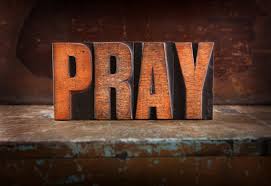“For the sake of your name.” That phrase, repeated twice in chapter 14 (7, 21) forms the basis of Jeremiah’s desperate prayer in a desperate time of Judah’s history.
The opening verses reveal a distressing situation: a draught has devastated the countryside and impacted the cities. The ground is cracked and dry because “there is no rain in the land” (4). Farmers are dismayed, nobles in the city are despairing, even the animals (deer and donkey) are in dying (5, 6).
 Jeremiah realizes that this draught is a divine discipline; he begins his prayer for help by saying, “Although our sins testify against us” (7). And Jeremiah is right. God is dealing with His disobedient people In verse 10, the Lord indicts His people for their wandering (“they greatly love to wander”) and wickedness (“they do not restrain their feet”). Because of their waywardness, the Lord “does not accept them” (receive favorably) but will “now remember their wickedness and punish them for their sins” (10). Justice will be served; judgment will come.
Jeremiah realizes that this draught is a divine discipline; he begins his prayer for help by saying, “Although our sins testify against us” (7). And Jeremiah is right. God is dealing with His disobedient people In verse 10, the Lord indicts His people for their wandering (“they greatly love to wander”) and wickedness (“they do not restrain their feet”). Because of their waywardness, the Lord “does not accept them” (receive favorably) but will “now remember their wickedness and punish them for their sins” (10). Justice will be served; judgment will come.
God tells Jeremiah to give up praying for the well being of the people (11). No fasting or sacrifice will change His mind to “destroy them with the sword, famine and plague” (12). The draught is the prelude to famine and plague. And the sword will be coming next.
But Jeremiah doesn’t stop praying. He doesn’t give up. Nor does God chastise him for continuing to plead for mercy and help. Jeremiah knows that God is not forbidding prayer as much as saying that judgment will not be averted because of it. But Jeremiah still sees the Lord as his only hope (“O Hope of Israel”—8), a hope based not on the power of his prayer or the worthiness of his people but on the Lord’s commitment to His own name. This hope is not simply the “wishful” kind of hope the people had (“We hoped for peace…”—19) but a sturdy confidence in God based on His covenant (21) and character (22).
Part of the problem in Israel is the confusing messages the people are receiving from those who claim to speak for God. The Lord blasts those prophets who “are prophesying lies in my name” (14). They claim to be giving God’s message when they tell the people, “You will not see the sword or suffer famine” but will enjoy “lasting peace in this place” (13). However, they are speaking “lies” and giving false hope. God indicts them for their “false visions, divinations, idolatries and the delusions of their own minds” (14). Here we see the source of false prophesy as demonic and/or psychological. Either way it is false and fatal to both the prophets who speak (“Those same prophets will perish by sword and famine”—15) and the people who hear (16). This is why it so crucial that those who claim to speak for God get their message from Him.
One of the primary tension points in the book of Jeremiah (and this chapter) is reconciling the unfailing, covenantal faithfulness of God and his fierce, just judgment on his sinful people. In this chapter, Jeremiah appeals to the covenantal relationship the nation has with the Lord (21) along with God’s own commitment to honour His great name (character, reputation). But it’s clear that God’s covenant commitment is not a spiritual “get out of jail free” card. In this chapter, God declares His intention to “destroy” His people with “the sword, famine and plague” (12). He will inflict a “grievous wound, a crushing blow” on Judah (17). His patience has run out; He’s intent on judgment. No amount of praying, fasting or sacrificing will change His mind (11).
The false prophets had concluded that God would somehow keep the nation from great suffering (“no sword or famine will touch this land”—15). They were sure of a brighter tomorrow—the draught would end, the nation would enjoy “lasting peace” (13). But God’s unfailing, covenantal love would not prevent or preclude His wounding, crushing judgment. He would send famine, sword and plague. Death would come on a wide scale level—not just to false prophets (15) but also to “wives, sons…daughters” (16). Even righteous people (Jeremiah, Baruch, Ebed-melech) would be caught in the deluge of suffering (though these three would be individually protected by God).
 So what does it mean that God’s love is unfailing (Lamentations 3:22)? It doesn’t mean He is indifferent to “righteousness” and unconcerned about “justice.” Jeremiah 9:23-24 says He delights in righteousness, justice as well as kindness (hesed). His covenantal love doesn’t mean He has unlimited patience with petulant wickedness. It doesn’t mean He blesses disobedience. Rather, it means He will not “reject Judah completely” (19). He will preserve among His people at least a remnant of faithful (not sinless) followers. He will see that there is a future and a hope for His people (29:11). He will support those whose hearts are His but will not always shield them from the wide scale punishment that comes upon the disobedient. Ultimately, His covenantal promises will be fulfilled—through not experienced by those break covenant with Him. Later revelation about heaven would reveal that the future is bright for those who live in covenant with Him—not always in the near term, but eternally.
So what does it mean that God’s love is unfailing (Lamentations 3:22)? It doesn’t mean He is indifferent to “righteousness” and unconcerned about “justice.” Jeremiah 9:23-24 says He delights in righteousness, justice as well as kindness (hesed). His covenantal love doesn’t mean He has unlimited patience with petulant wickedness. It doesn’t mean He blesses disobedience. Rather, it means He will not “reject Judah completely” (19). He will preserve among His people at least a remnant of faithful (not sinless) followers. He will see that there is a future and a hope for His people (29:11). He will support those whose hearts are His but will not always shield them from the wide scale punishment that comes upon the disobedient. Ultimately, His covenantal promises will be fulfilled—through not experienced by those break covenant with Him. Later revelation about heaven would reveal that the future is bright for those who live in covenant with Him—not always in the near term, but eternally.